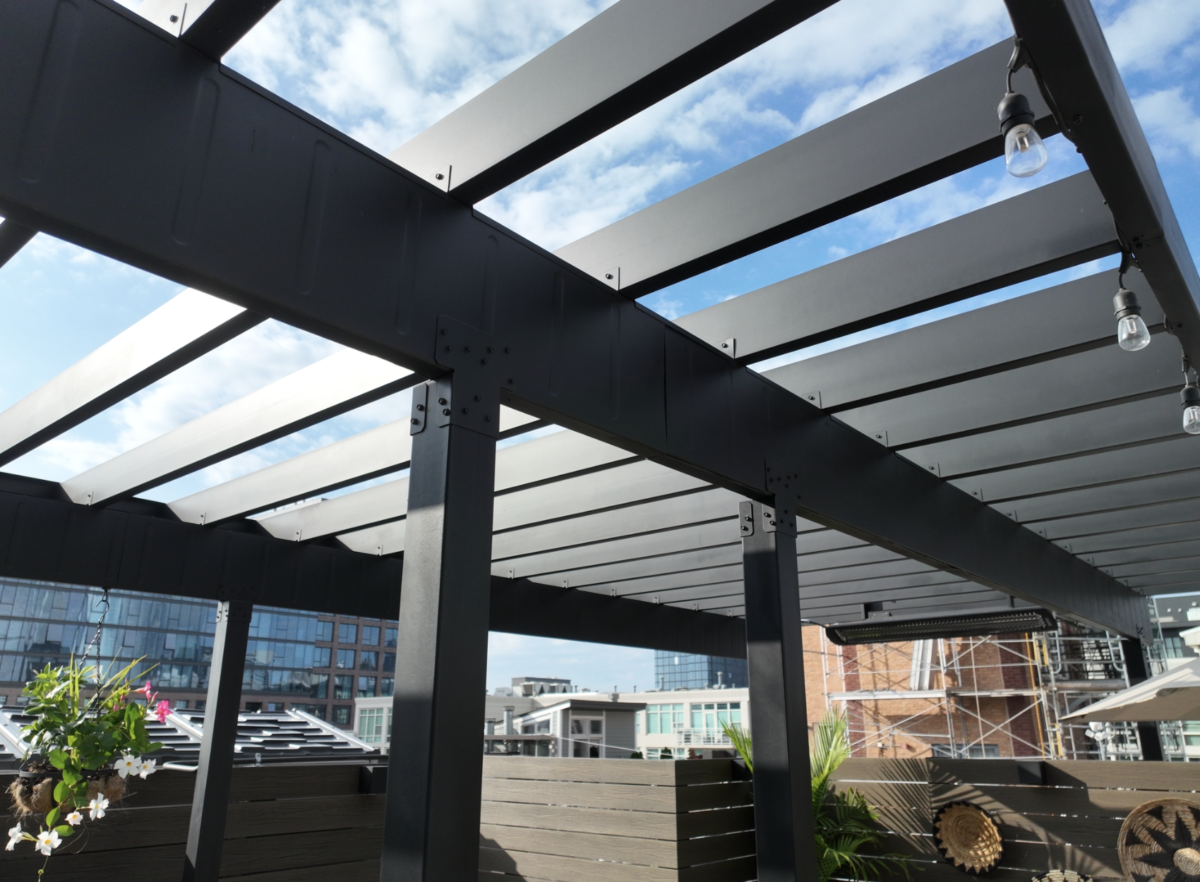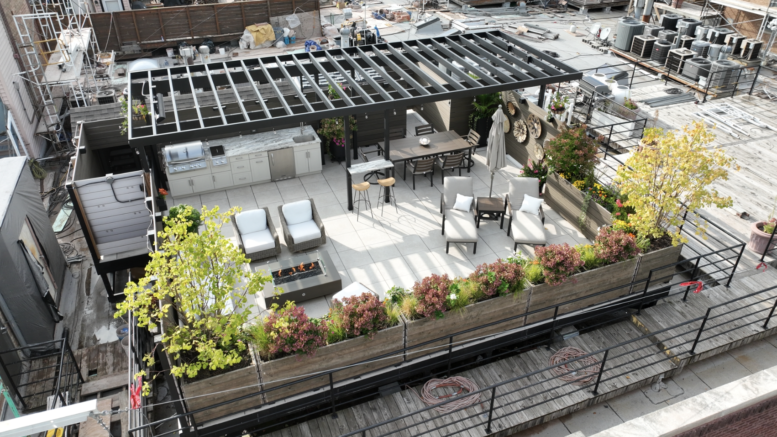Chicago resident Marie Delgavio owns an industrial-style loft in the heart of the city’s West Loop neighborhood. What sets her residence apart from others on the block is its private rooftop, which is a “highly sought-after home amenity for city dwellers like me,” Delgavio says. While incredible even in its bare form, Delgavio saw her underutilized rooftop as an opportunity to design a functional and inviting outdoor living space where she could relax, entertain, cook and tend to her container garden. “Living space is limited in condominiums and homes in the city, so it’s important to take advantage of any usable outdoor space,” she adds.
To bring her vision to life, Delgavio commissioned a new 1,000-square-foot rooftop deck structure. From the get-go, Delgavio knew that Chicago’s Building Code Modernization Ordinance, which the city passed in 2019, would dictate the deck design and construction process. The landmark ordinance marked the adoption of the 2018 International Building Code (IBC) and International Existing Building Code (IEBC), aligning Chicago’s construction requirements with up-to-date model codes and standards used in other major U.S. cities. The first comprehensive change to the city’s building code in 70 years, the updates provide a critical framework to keep buildings as safe as possible while encouraging innovative design and construction practices.
Prioritizing Fire Resistance

The modernization of Chicago’s construction codes focused on several significant areas, including fire and life safety, building materials, and the rehabilitation of existing buildings. Most pertinent to Delgavio’s rooftop deck renovation were the code revisions requiring fire-resistive building materials and methods. According to Chapter 15-8, Section 510 of Chicago Building Code, “all roof structures hereafter placed above the roof of any building exceeding 55 feet in height shall be constructed of noncombustible materials and shall be supported by construction of noncombustible materials.”
Needing a code-compliant, lasting solution, Delgavio turned to the Evolution steel deck framing system from Fortress Building Products. The fire-smart system received a Class A fire rating through Intertek, an independent product testing, inspection and certification company. A marker that indicates superior fire performance, a Class A designation is the best fire rating a building material or product can receive. Materials that fall into the Class A category are very unlikely to contribute fuel to a fire, reducing the vulnerability of a structure and the people inside of it or near it.
A noncombustible option that meets 15-8-510 of Chicago Building Code,the deck framing systemprovides premium weatherability and low maintenance qualities. Leveraging the proven performance of steel, the framing system can sidestep common issues that plague traditional building products in outdoor applications, such as deterioration after long-term exposure to moisture and warping as a result of extreme changes in temperature. In application, the steel frame profiles will remain straight and true over time. This makes for an enduring, dimensionally stable deck framing solution that keeps the surface material flat and smooth underfoot. In this instance, the project team installed a 1/4-inch underlayment material on top of the frame and then put down contemporary stone pavers.
Custom Rooftop Pergola
Not only do steel profiles offer enhanced durability and longevity, but they’re also sleek and good-looking. The project team capitalized on these qualities, using the noncombustible building material to design a custom rooftop pergola. In application, the modern contemporary steel pergola provides definition to the rooftop deck, transforming the space into an open-air living and dining “room” tucked underneath the towering Chicago skyline.
Elevating the functionality and overall feel of the space, Edison-style string lights run along the perimeter of the pergola and a heater hangs directly over the top of the outdoor kitchen. Because the uncovered steel rafters are hollow, there is a natural space to hide the unattractive electrical wires from the outdoor amenities. Delgavio finished setting the scene by arranging comfortable seating zones for relaxation and entertaining. Carefully tended garden containers provide pops of color and texture along the edge of the rooftop deck.
This urban rooftop living space was completed in the spring of 2022. While large in size (especially for a private outdoor space in a densely populated location), the deck feels intimate and comfortable, inviting friends and family to enjoy an evening drink during Chicago’s fairer weather months. And when the space is not in use, Delgavio can rest easy knowing that the steel frame that supports the rooftop deck will retain its strength even after long-term exposure to Chicago’s notoriously harsh winters. For ultimate peace of mind, the noncombustible framing system, which meets the city’s tough fire-resistive construction requirements, is backed by a 25-year limited manufacturer warranty.
TEAM
General Contractor: BoBo Construction, Chicago, Illinois, bobo-construction.com
Consultant: Todd Smith, BLA, CSI, CDT, LEED Green Associate
MATERIALS
Steel Deck Frame: Evolution, Fortress Building Products, fortressbp.com


Be the first to comment on "Rooftop Deck Meets Requirements of City’s Updated Building Code"